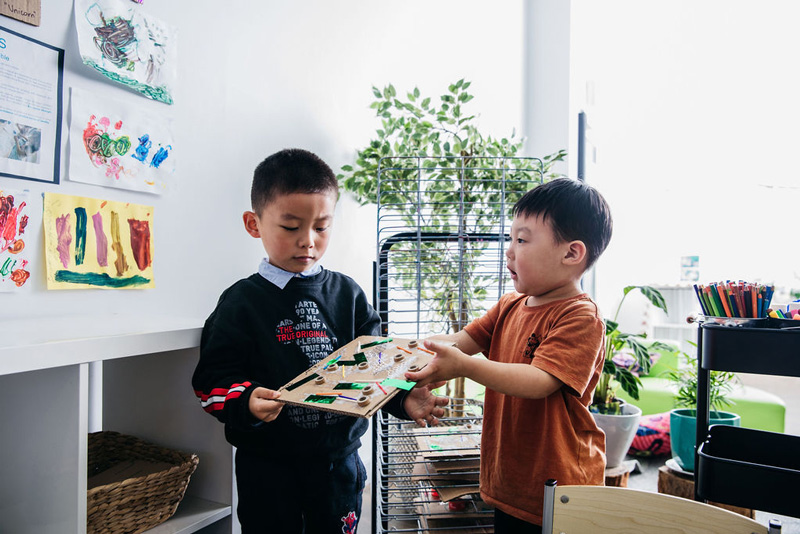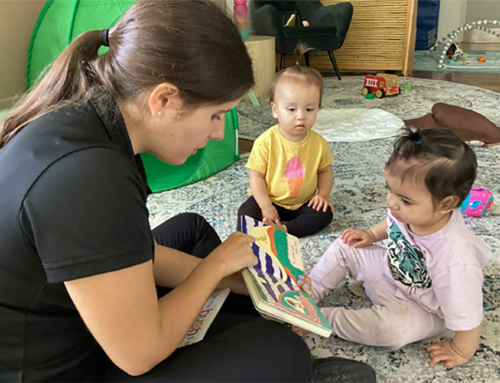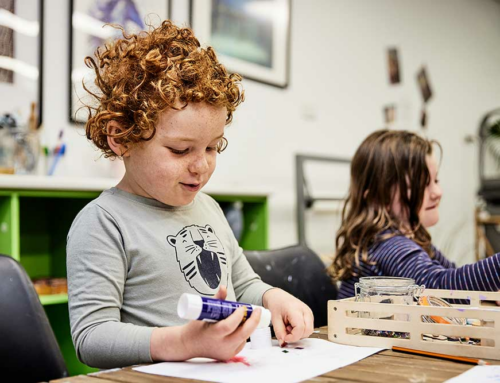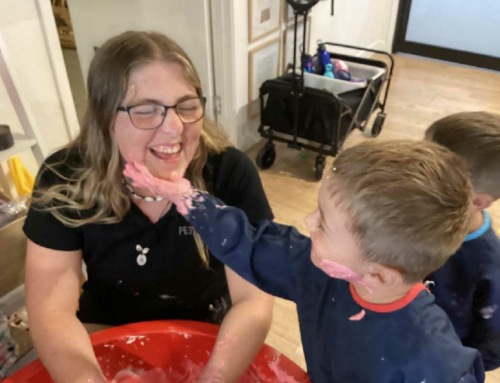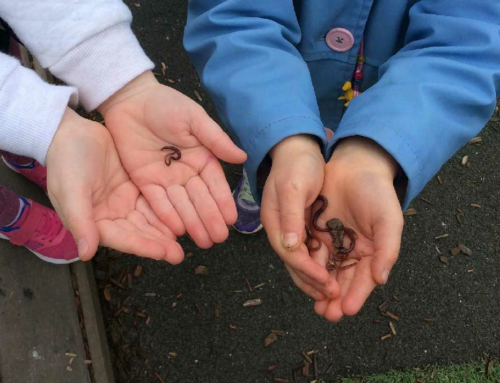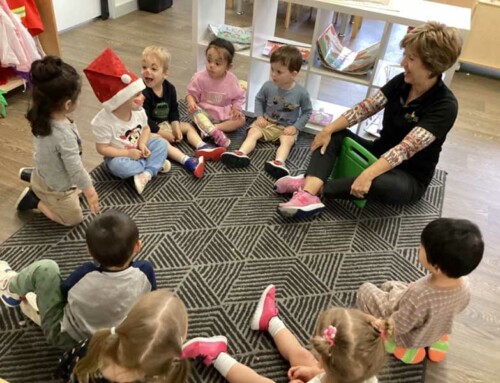Children are naturally empathetic and kind in their early years. Around the age of 3.5 to 4 years, they begin to understand the concept of learning to share. Sharing isn’t just an act of kindness to be appreciated, although it’s a desirable behaviour that has many social benefits.
While they may not yet understand the concept of sharing, we can encourage generosity while also promoting children’s agency to make choices and decisions that impact on their world, such as sharing when they’re done playing.
One of the best ways for children to learn how to share is through role model behaviour. When families share, children feel more comfortable mimicking the same behaviour. Children notice when we share our own belongings, what we share, with who and when we don’t share things.
Inspiring children to share through our own actions is important, but we can also provide opportunities for children learning to share through thoughtful conversations and practical experiences. We outline some of these approaches in this article including:
The importance of sharing and turn-taking.
- Why we should encourage children to share when they’re done playing.
- Children sharing toys, books, people and other things.
- Encouraging generosity through acknowledgement, not praise.

The importance of sharing in early childhood
It’s never too early to introduce your child to the concepts of turn taking and sharing, even though they may not begin to carry out this skill successfully until their kindergarten and preschool years.
Knowing how to take turns and when to share is an important social skill that forms a life-long foundation for successful relationships. Learning to share has many benefits and it is not just about avoiding child disagreements.
Associative play or playing in groups can begin between the ages of 2 and 3. This age is a good time to start discussing and encouraging the concept of sharing and turn taking. Although the concept of sharing for a two-year-old may be vastly different from how a five-year-old sees sharing.
Genuine sharing helps children:
- Make friends.
- Engage in cooperation and collaboration.
- Strengthen their social skills.
- Promote kindness and empathy.
- Build resilience.
- Develop language skills.
- Experience joy.
When children take turns and share, they also learn that they can’t always have their way. This helps children develop important skills such as emotional regulation, patience and tolerance.
Encouraging children when learning to share also teaches children to take others’ feelings into account when making decisions. Building children’s emotional intelligence is an important part of their social development and sharing helps children practise this vital skill.

Why we should encourage children to share when they’re done playing
In the book, “It’s okay NOT to share” (2012) by Heather Shumaker, children are encouraged to make the choice not to share until they are done playing. Rather than being told to share when another child demands their toy, they are encouraged to say no (if that’s their choice).
The concept is explained by way of an adult reading a magazine. If another person comes up to you to demand the book and you haven’t finished reading it yet, do you hand it over? No. Instead, you’d expect the person to wait their turn.
In this instance rather than teaching a child to share a toy when another wants what they have, both children are encouraged to participate in turn taking. The second child can have the toy when the first child has finished playing with it.
Shumaker explains that telling children to share on request, “interrupts play, erodes parent-child trust and teaches false generosity.” Instead, we should be encouraging sharing, giving children sharing choices and promoting turn taking when a child is done playing.
This concept not only holds up the child’s right to play but also promotes children’s agency to make decisions. By trusting children to make their own decisions it encourages them to communicate, set limitations and express their feelings.

Children sharing toys, books, people, space and other things
Sharing is a life-long skill that children learn through experience. By providing children with learning to share opportunities and sharing choices about when and what to share, children learn how to be generous.
And it is not just toys or books where children’s sharing crosses some uncomfortable ground for adults. Sharing friends is another area where children may display possession.
Encouraging friendship skills such as offering to play with children they have just met and promoting kindness and empathy towards other children can help children foster social skills.
Some children are more naturally inclined to look after younger children in their playgroup. However, it’s also important to let children know they don’t have to be friends to play or work together. Some children might be happy to play alone while others may feel anxious or shy when meeting new people.
All children learn best through play though and it is during times when we provide them with the opportunities to play in groups where they can practise their social skills, learn to share and take turns.
By the time they are of school-age, children will have a stronger sense of fairness.

One way to encourage children learning to share is through acknowledging their effort. Praise the process, “You shared your blocks there. That’s great!” Acknowledging their effort fosters motivation and increases their desire to try again.
Encouraging children to say thank you when another child shares something with them also encourages the art of sharing and mindfulness. Research has shown that children’s sharing behaviour (and adults) increases when their generosity is noticed. Sharing and recognition rewards both parties. It makes them feel good and more likely to repeat the positive behaviour.
The best way to encourage children to say thank you is by doing it yourself. When children see and hear you acknowledge others, they naturally pick on the social cue and learn to say thank you themselves.
When creating experiences and opportunities for children to learn sharing skills, be accepting and keep it realistic. Recognise that some children will find it hard to share whether it is their toys or personal space. With gentle encouragement, they will learn what to share and when.
Other ways that you can encourage your child to share and take turns, include:
- Using words and phrases that encourage sharing and sharing experiences like:
- Please and thank you.
- When you’re done, can I play with that?
- Charlie is playing with that now, perhaps he’ll let you have it when he’s finished?
- Why not ask Jaxon if you can play with him in the sandpit?
- Practise sharing with your child at home.
- Host a playdate with one or two children so they can practise sharing.
- Encourage family sharing with older or younger siblings especially when they play together.
- Read a book together about learning to share, making friends and playing together.
- Play board games – this is a wonderfully fun way to learn about turn taking.
There are some things that you may not want your child to share at all. Food may be one of the items due to allergies and hygiene. School-age children with lunches from home are likely to swap and share their food at snack time, so it’s important to address why this is not a good idea.
Sharing can sometimes be difficult. But through gentle encouragement and positive reinforcement, children can learn the art of sharing.
With time, patience and practice, children will learn to share not just toys and books, but also their time, friends and space. And that’s a lesson children can be proud to pass on.

Inspire your child with Petit Early Learning Journey
At Petit ELJ, children always come first. We believe in supporting their agency and rights to make decisions that actively contribute to their experiences. We encourage children to build empathetic, trustworthy and harmonious approaches to life.
Children’s ideas and conversations inspire our curriculum. Give your child’s curiosity the room to grow in our purpose-built environments where children are invited to play and learn. Come visit your nearest Petit ELJ centre and discover how we can inspire your child and give them the best start in life.
